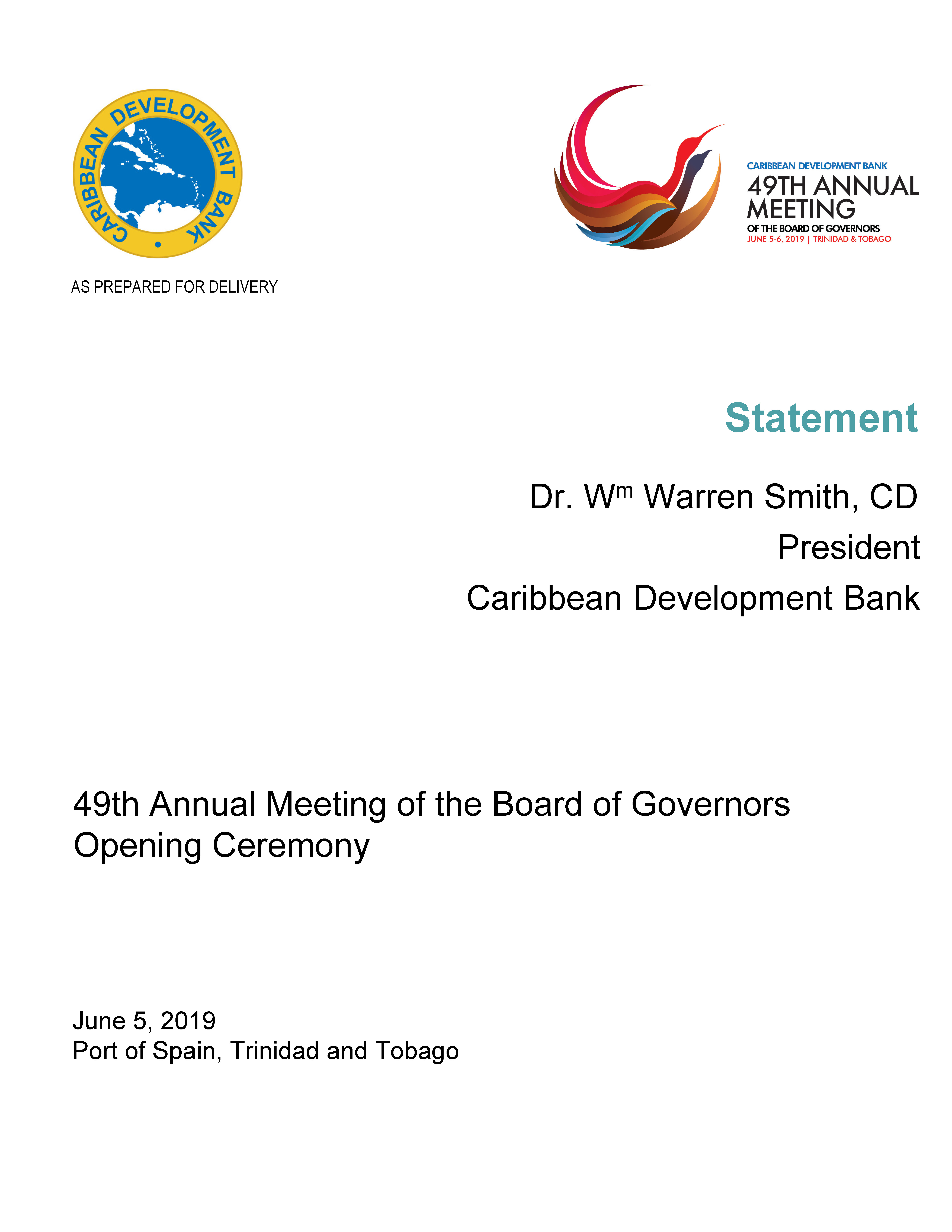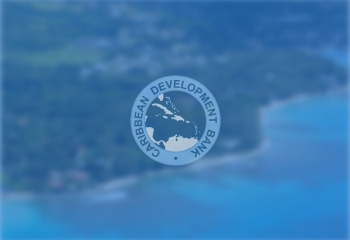
Introduction
As we touched down at Piarco airport on Saturday evening, my mind went back to 1968 when I, as a 16 year old, first set foot on this beguiling twin island Republic of Trinidad and Tobago. Way back then, I was mesmerised by the diversity and uniqueness of its culture, the infectious energy of its people, and the natural beauty of these two islands.
The national motto, “Together we aspire, together we achieve”, is a rallying cry for our Region as we forge forward to the next decade of delivering on the promise of a Caribbean that is prosperous and more equal.
This morning, we are honoured to have with us on the platform, the Minister of Finance and Acting Prime Minister of Trinidad and Tobago, the Honourable Colm Imbert. Through you, Minister Imbert, and on behalf of the Board of Governors, the Board of Directors, the Management and Staff of the Caribbean Development Bank (CDB), I want to thank your Government for agreeing to host our Governors’ Meeting, this year.
Let me also acknowledge the Chair of CDB’s Board of Governors for 2019, and the Minister of Planning of Trinidad and Tobago, the Honourable Camille Robinson-Regis. Thank you Minister Robinson-Regis for your continuing staunch advocacy of CDB, and for taking time out from your busy schedule to spend a day at our Headquarters on April 10th this year.
In fulfilling her role as Chair, she met and exchanged views with our Management Team and our Staff. We appreciated her frank advice and sage counsel on how we can be more effective in our daily work.
What are we going to Talk About?
The theme of our Annual Meeting, this week, is expressed in one word – “Transformation!”
It is inspired by a growing sense I have, and which is shared by many of my colleagues, at the CDB and, I daresay, across our Region, that we are running out of time!
We are moving too slowly in doing those things which will ensure that, by the year, 2030, our Region will have delivered on our promise to eliminate poverty, and to reduce inequality.
The theme is also consistent with our conviction, at the CDB, that our Borrowing Member Countries (BMCs) are, for the most part, now on the right track. They are at varying stages of embracing the correct policies, and learning from the successes and the mistakes of other countries.
This is encouraging!
However, the main thrust of my remarks, this morning, is that we will have to step up the pace of implementation of our reform agenda. In so doing, I will return to the core challenges which all of our BMCs will have to address, and the new areas of opportunity which they must seize, if we are not to be left behind.
In addition, I will share some of the ongoing and proposed reforms at CDB, and how they will support a revision of our suite of products; enhance the quality and speed of engagement with our clients; and strengthen the Bank’s financial performance through improved efficiency.
BMCs’ Aspiration and the 2030 Sustainable Development Agenda
At the beginning of the century, a number of Caribbean Governments signaled their aspiration to develop societies that are prosperous, socially just and globally competitive by the year 2030. This was buttressed by comprehensive long-range planning by a number of countries which set specific targets and timelines for achievement. These countries include Barbados (2025), Belize (2030), Jamaica (2030),
St. Lucia (2030) and Trinidad and Tobago (2020). Trinidad and Tobago has now revised its target year to 2030.
For the most part, these ambitious plans align with the objectives of the 2030 Sustainable Development Agenda, a global blueprint for ending poverty and achieving a level of human development that is fair and inclusive, and offers a more sustainable future for all.
This Agenda challenges us to refashion our BMCs so that our people become the ultimate beneficiaries of sustainable development and shared prosperity. There is an expectation that this change will:
- improve our people’s well-being by creating greater access to decent jobs;
- lead to a closer alignment between labour market requirements and the quality of skills provided by the education system;
- foster the emergence of an appropriate eco-system to unleash the dynamism of the medium, small and micro-enterprises (MSMEs); and
- offer adequate protection for vulnerable and disadvantaged groups in the society.
In a nutshell, no one is to be left behind!
Transformation in BMCs
We have to acknowledge that our Region is off track in delivering on the promise of prosperity and social justice for our people. Unemployment remains at unacceptably high levels in many countries; economic, social and environmental vulnerabilities are increasing; citizen security is under threat; and poverty levels are not falling fast enough. These difficulties have been exacerbated by lacklustre economic growth; unsustainable national indebtedness; and weak fiscal management.
We need to ask ourselves, therefore, “Is 2030 still an achievable timeframe for delivering on this promise?”
My conviction is that…“Yes it is!”
So, how can we get it done? Where do we start?
First, we need to reflect on the reasons for the derailment. Next, we must draw lessons from the experience and adjust our plans and strategies, accordingly. Then, most importantly, we must accelerate the pace at which corrective measures are put in place.
What, then, contributed to this derailment?
In my view, the main factors were:
- the global financial crisis of 2008 and “the Great Recession” which followed;
- the volatility of the international petroleum markets and depressed prices for other commodity exports;
- the increased frequency and intensity of tropical cyclones and other climate actions;
- an unfavourable business environment in which the pace and breath of “doing business” reforms lagged behind the rest of the world; and
- inadequate fiscal and debt management.
The combination of these factors contributed to the region-wide deceleration of economic activity since the peak of the global financial crisis in 2009. Economic growth slowed to less than 1% per annum between 2009 and 2018.
Foreign reserves declined, at times, dropping close to, or below the international benchmark of three months of imports. Weakening external positions coupled with poor fiscal performances led to an acute buildup of public debt. At the end of 2018, Government debt exceeded the international benchmark of 60% of gross domestic product (GDP), in at least 10 BMCs, with one reporting debt in excess of 100% of GDP.
Further, our BMCs, which are mainly small island, developing and low-lying coastal states are being adversely affected by climate variability and sea level rise, with the negative impact estimated to range from 5% to as high as 30% of GDP.
Many of the BMCs have begun to address these problems. St. Kitts and Nevis, Grenada, Jamaica and now Barbados have undertaken extremely difficult reforms to respond to their fiscal and debt challenges. Trinidad and Tobago is likewise pursuing a similar reform agenda. The reforms are also addressing improvements in the business environment; but we will return to that point anon.
In response to the climate threat, virtually all BMCs now purchase CCRIF parametric insurance cover against hurricanes, flooding and earthquakes. This is gratifying. However, in many instances, all of the perils are either not covered or the coverage is inadequate relative to the assessed risk.
Other instruments such as cat bonds and fiscal buffers are also being deployed by some BMCs to ensure that funding is readily available for reconstruction in the event of a natural disaster.
Additionally, the climate proofing of existing infrastructure, including along our coastal zones, require accelerated attention because climate change is intensifying.
Responding appropriately to external economic shocks calls for added attention being paid to building resilience to these shocks. Maximising the agriculture sector’s potential to reduce exposure to volatile prices for food imports promises to do just that.
A similar opportunity now obtains with rapid improvements in the use of technology, especially for the exploitation of indigenous renewable sources of energy.
The factors which have interrupted our Region’s progress are multi-faceted but are, in the main, external, environmental and economic shocks. We have all learnt that we can take specific actions to become more resilient to such events and threats.
Economic Growth and the Business Environment
It is now “old hat”, that economic growth is a necessary, but not a sufficient condition for reducing poverty and it is stale news to announce that the average growth rate of Caribbean countries underperforms that of other small island developing states. We also broadly accept that a conducive business environment is critical to attracting domestic and international private investment, a key ingredient for increasing growth.
The World Bank’s “Doing Business Report” is also now a widely recognised guide for identifying attractive countries for investment. Importantly, the Report outlines a set of regulations that either enhance or constrain business activity.
Most of our Governments have adopted these indicators as a measure of progress made in improving the business environment. This notwithstanding, the 2019 Report shows that the Region’s average performance has declined noticeably from 81 out of 181 countries in 2009 to 126 out of 190 countries in 2019.
These results point to a disappointing lack of progress, and are a stark reminder that considerable work still needs to be done in this area to accelerate economic growth and to improve our Region’s chances of achieving the Sustainable Development Goals (SDGs) by 2030. What it also signals is a clear opportunity to focus on that complex of business related reforms which, when combined with other reforms, can translate into accelerated economic growth for our countries.
Economic Growth and MSMEs
In the Caribbean, MSMEs are the backbone of the regional private sector, accounting for more than 50% of enterprises and over 50% of GDP. They are also the main source of jobs and a substantial contributor to economic opportunities for the poor, the vulnerable and the youth in our Region. Therefore, MSMEs have a critical role to play in the achievement of the SDGs.
The challenge is that our MSMEs require considerable assistance in accessing loan and equity financing needed to modernise and expand their businesses. They also require assistance to formalise their businesses by keeping proper accounting records and adopting sound business practices.
Digital Transformation
One exciting opportunity for our BMCs to leapfrog to the 2030 Agenda is to harness the power of digital technologies that are now part of the Fourth Industrial Revolution.
There is increasing evidence of BMC governments and public sector agencies capitalising on information and communication technology to reduce administrative burdens, resolve resource allocation issues, and improve government accessibility and efficiency. By prompting changes in the legal and regulatory framework, these developments, are revolutionising how government services are provided and how business is conducted within and across borders.
Technological advancements are also enabling the modernisation of the agricultural sector worldwide. Farmers are embracing these technologies to achieve productivity, efficiency and profitability improvements, and to operate in safer and more environmentally-friendly conditions.
Similar opportunity now obtains with rapidly improving technology for the greater and speedier exploitation of indigenous renewable sources of energy.
Our BMCs are well positioned to take full advantage of the greater access to technology. Based on the experience of Estonia, which started to build its own information society some 20 years ago, the Caribbean possesses a number of characteristics that make us ideal candidates for digital transformation.
Within the last two decades, we have made great strides in advancing the uptake and use of ICTs, largely due to liberalisation and the increased competition in service markets. The average share of individuals using the internet in our BMCs jumped from 24% to 59% between 2005 and 2016, according to the International Telecommunication Union[1].
Digital Transformation and MSMEs
Earlier, I drew attention to inadequate access to finance as a factor that constrained the development of MSMEs and other competitive sectors. While this remains valid, many small businesses and individuals who were previously unbanked are now gaining access to financial services, thanks to the new products being rolled out in our BMCs by Fintech companies.
Financial inclusion continues to advance with the advent of new technologies and business models that use telecommunications devices and networks to facilitate payments into the financial system. This is exciting news for MSMEs, in particular. For the first time, we may actually now have the tools that allow everyone to participate in economic development via the formal financial system.
Digital Transformation and Education
Modern technologies can revolutionise the way we learn; how we equip students and workers with 21st Century skills; and how we deploy technology in poor, underserved, and remote communities. New technology is able to accommodate access by everyone to the same level and quality of teaching, irrespective of ability to pay, location or other limiting factors.
Let us not miss this wonderful opportunity to truly democraticise education in our Region.
Transformation in CDB
I have just outlined some key actions that our BMCs need to take or pursue with greater intensity so that the goals of the 2030 Sustainable Development Agenda can remain within our reach.
I will now examine the role that CDB can play in helping our BMCs to realise these goals.
At CDB, we are continuously re-examining our business model to determine its suitability for serving our BMCs effectively in the context of a changing global landscape. The preferred business model will ensure that the Bank’s operations are undergirded by higher levels of efficiency and effectiveness.
As a financial institution which issues debt on the international capital markets, we maintain a strong capital position to retain the credibility of both our investors and the international rating agencies.
Internal Reforms
Recognising the changing external environment, we have taken pre-emptive action and introduced a multi-faceted transformation programme, which incorporates a set of key internal reforms. The objective is to strengthen CDB’s resilience to exogenous shocks and improve operational efficiency and effectiveness.
We have started the process for our next strategic plan to cover the period
2020 – 2024. The proposed strategic framework, to be discussed with our Governors tomorrow, was informed by an independent survey of key stakeholders who stressed the need for CDB to be more responsive to its clients; to build a larger loan portfolio; and to improve its disbursement performance.
This is valuable feedback, which demands urgent action from the Bank.
To resolve these and other burning issues, CDB is carrying out a comprehensive review of its main business processes. This review is emphasising re-design of processes which affect the time taken to appraise and approve projects and to supervise and disburse funds for projects under implementation.
In the business process reviews, the use of digital technology will be examined and deployed, where appropriate. Once these processes have been re-engineered, the organisational structure will be redesigned to enhance the overall efficiency and effectiveness of the Bank.
Technology Support
We intend to use digital and other emerging technologies, where appropriate, to become a more customer-centric Bank.
In that regard, in 2018, we began a process of restructuring the Bank’s information technology support, by the recruitment of staff and the acquisition of new digital infrastructure. Already, benefits are being realised, mainly in the areas of collaboration and operational efficiencies.
We will also be mainstreaming digital technologies into our project design. This will require us to view all new project proposals through a “digital lens”. In this way, we will use modern technologies and practices for best results and maximum project impact for beneficiaries.
CDB and MSMEs
We are determined to play a bigger role in unleashing the potential of MSMEs in our Region. CDB’s approach to galvanising new financing for MSMEs will be centred around the creation of a pool of funds which is off CDB’s OCR balance sheet. These funds will be used to provide loans, equity, and technical assistance to MSMEs. Furthermore, partial credit guarantees will be made available to incentivise financial institutions to lend to these small enterprises.
Our intention is to develop an appropriate ecosystem within which small businesses can truly flourish. Part of that ecosystem must be junior stock exchanges on which these small businesses can list. They will then have access to equity capital which will enable them to grow and morph into larger businesses. Jamaica's experience proves that generous tax holidays can be a powerful stimulus for galvanising small businesses to list.
Conclusion
I admit that the way forward will not be without its challenges and setbacks. However, opportunities abound. Our BMCs sit on the cusp of a metamorphosis that encompasses digital transformation, unleashing the power of the private sector, including MSMEs, and among other things, democratising education. With the assistance and support of CDB, working alongside our development partners, this could well be our “moonshot moment”.
As we, in the Caribbean, look to the future and the realisation of these bold aspirations, the road march winning words of the indomitable Trinidadian, Calypso Rose, “Gimme More Tempo!” can serve as our call to action. We can leapfrog to the realisation of the SDGs by 2030, once we find the right melody, work in harmony and pick up the tempo!
Madam Chair,
I thank you.
[1]ITU, 2017


